![[SFW]_Zetman_-_02_[720p][10bit][936E7496].mkv_snapshot_03.45_[2012.04.10_13.16.05] [SFW]_Zetman_-_02_[720p][10bit][936E7496].mkv_snapshot_03.45_[2012.04.10_13.16.05]](https://lh4.ggpht.com/-EZVa3ZnUKz4/T4SljiGRb5I/AAAAAAAA-9w/oVpvwEoKzPU/%25255BSFW%25255D_Zetman_-_02_%25255B720p%25255D%25255B10bit%25255D%25255B936E7496%25255D.mkv_snapshot_03.45_%25255B2012.04.10_13.16.05%25255D_thumb.jpg?imgmax=800) |
![[SFW]_Zetman_-_02_[720p][10bit][936E7496].mkv_snapshot_14.50_[2012.04.10_13.27.10] [SFW]_Zetman_-_02_[720p][10bit][936E7496].mkv_snapshot_14.50_[2012.04.10_13.27.10]](https://lh3.ggpht.com/-WsHNZ58Lxok/T4SllU3xR-I/AAAAAAAA--A/HkEOWjFvkrA/%25255BSFW%25255D_Zetman_-_02_%25255B720p%25255D%25255B10bit%25255D%25255B936E7496%25255D.mkv_snapshot_14.50_%25255B2012.04.10_13.27.10%25255D_thumb.jpg?imgmax=800) |
![[SFW]_Zetman_-_02_[720p][10bit][936E7496].mkv_snapshot_21.29_[2012.04.10_13.34.28] [SFW]_Zetman_-_02_[720p][10bit][936E7496].mkv_snapshot_21.29_[2012.04.10_13.34.28]](https://lh3.ggpht.com/-dsrHBHbF4uA/T4SlmheAsWI/AAAAAAAA--Q/kaVEz-Wv1zk/%25255BSFW%25255D_Zetman_-_02_%25255B720p%25255D%25255B10bit%25255D%25255B936E7496%25255D.mkv_snapshot_21.29_%25255B2012.04.10_13.34.28%25255D_thumb.jpg?imgmax=800) |
Zetman is definitely one of those instances where I’m glad not to have read the source material.
If there was any chance the premiere of this series was a fluke, for me it was dispelled in the excellent second episode – no breaks in the blogging schedule for me here. In my case I’m able to enjoy Zetman strictly for what it is as an anime, without the wailing and gnashing of teeth I see from the manga faithful horrified at how their prize is being adapted. There are certainly legitimate concerns here, when you’re talking about a long-running series that appears headed for a self-contained one-cour anime. I can’t speak to that, though – all I know is that I like what I see so far, very much in fact. This is a handsome and well-produced series with a strong sense of the dramatic.
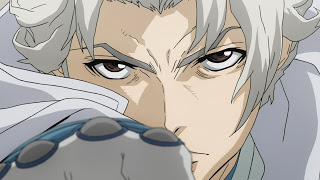 I’m still not sure to what extent Katsura-sensei is doing an homage to the American dark superhero genre, or in fact a deconstruction – perhaps that will become clearer as we progress. For now this feels very much like a straightforward effort by a skilled mangaka to write a classic superhero drama in the mold of Alan Moore (a Brit, as it happens), and based on what I’ve seen it’s an outstanding effort. Everything that happens seems vaguely familiar, because this is very much an archetypal story for anyone with a grounding in American pop culture – thus far I can’t think of a single plot element or character that couldn’t just as easily come from a DC graphic novel of 80’s vintage. But that’s not a bad thing – if anything, it’s impressive that a Japanese author should have such an innate and accurate understanding of this medium.
I’m still not sure to what extent Katsura-sensei is doing an homage to the American dark superhero genre, or in fact a deconstruction – perhaps that will become clearer as we progress. For now this feels very much like a straightforward effort by a skilled mangaka to write a classic superhero drama in the mold of Alan Moore (a Brit, as it happens), and based on what I’ve seen it’s an outstanding effort. Everything that happens seems vaguely familiar, because this is very much an archetypal story for anyone with a grounding in American pop culture – thus far I can’t think of a single plot element or character that couldn’t just as easily come from a DC graphic novel of 80’s vintage. But that’s not a bad thing – if anything, it’s impressive that a Japanese author should have such an innate and accurate understanding of this medium.
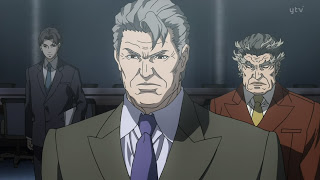 The pacing continues to be intense, with important stuff happening in virtually every frame, though I found it less off-putting here than I did last week. We have a traditional good vs. evil plot with Jin – now a buffed-out teen played by Namikawa Daisuke – being the “Zet”, the prize long sought by the villainous founder of Amagi Corporation, Mitsugai (Iizuka Shouzo) ever since Kanazaki escaped with him as a baby. The more interesting sub-plot, however, promises to be the conflict between Jin and childhood friend (though not in the manga,) Mitsugai’s grandson Kouga (Miyano Mamoru). Kouga is idealistic, handsome, and naïve – thinking he can leave his sheltered world and “fight for justice” as a prefab superhero. There’s also the now adolescent Konoha, who Kouga sweeps up into his venture against her will and who seems to have harbored a strong crush on Jin since their childhood days.
The pacing continues to be intense, with important stuff happening in virtually every frame, though I found it less off-putting here than I did last week. We have a traditional good vs. evil plot with Jin – now a buffed-out teen played by Namikawa Daisuke – being the “Zet”, the prize long sought by the villainous founder of Amagi Corporation, Mitsugai (Iizuka Shouzo) ever since Kanazaki escaped with him as a baby. The more interesting sub-plot, however, promises to be the conflict between Jin and childhood friend (though not in the manga,) Mitsugai’s grandson Kouga (Miyano Mamoru). Kouga is idealistic, handsome, and naïve – thinking he can leave his sheltered world and “fight for justice” as a prefab superhero. There’s also the now adolescent Konoha, who Kouga sweeps up into his venture against her will and who seems to have harbored a strong crush on Jin since their childhood days.
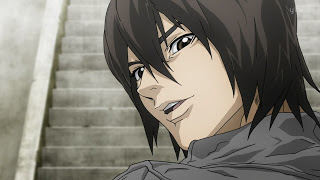 That element especially is classic to the genre, and it and the general Amagi family dynamic are the most intriguing plot elements for me. Kouga’s mother Youko (Hisakawa Aya) and sister are clearly rebels against the family, spending their time feeding the homeless in Undertown, and there are signs Youko’s marriage to Kouga and Konoha’s father Seizou (Hirose Masashi) is strictly for show. Especially fascinating was Kouga’s reaction when the firefighters asked him if he’d saved the children and their mother from the fire he’d dived into in search of the arsonist terrorizing Tokyo. Of course it was Jin who was responsible for the risky plan to save the entire family, while Kouga wanted to leave the mother – but Kouga hesitated when asked. He seemed to be trying to convince his father of the truth later on, but his moral standing in this story is very much the big variable in my eyes. He could definitely go either way, as could his relationship with Jin. I can see why manga readers are concerned that the anime made him a childhood acquaintance of Jin – though it doesn’t change much on the surface, the dynamics of their relationship are inevitably going to be quite different as a result. My suspicion is that this change was made quite intentionally with an eye towards an anime-original ending.
That element especially is classic to the genre, and it and the general Amagi family dynamic are the most intriguing plot elements for me. Kouga’s mother Youko (Hisakawa Aya) and sister are clearly rebels against the family, spending their time feeding the homeless in Undertown, and there are signs Youko’s marriage to Kouga and Konoha’s father Seizou (Hirose Masashi) is strictly for show. Especially fascinating was Kouga’s reaction when the firefighters asked him if he’d saved the children and their mother from the fire he’d dived into in search of the arsonist terrorizing Tokyo. Of course it was Jin who was responsible for the risky plan to save the entire family, while Kouga wanted to leave the mother – but Kouga hesitated when asked. He seemed to be trying to convince his father of the truth later on, but his moral standing in this story is very much the big variable in my eyes. He could definitely go either way, as could his relationship with Jin. I can see why manga readers are concerned that the anime made him a childhood acquaintance of Jin – though it doesn’t change much on the surface, the dynamics of their relationship are inevitably going to be quite different as a result. My suspicion is that this change was made quite intentionally with an eye towards an anime-original ending.
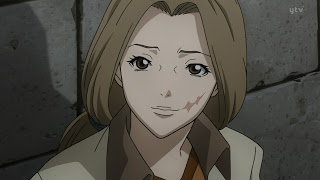 There’s certainly something lost in depicting Jin’s journey from naïve little boy to hardened killing machine as quickly as it was here, but the arc still feels coherent and believable to me. We see that the teen Jin is already hard enough to kill the Player who started the fires without a tinge of regret, and willing to risk the lives of the children in the burning building rather than see them live on as orphans. Now that poor Akemi – already reduced to being a crepe-seller on the street with her face scarred forever and her old career impossible – seems to have been murdered for reals, one can only assume Jin is going to become even more bitter and ruthless. I can appreciate what the dramatic impact of the relationship between Jin and Akemi could have been with more time, because it’s powerful even as depicted – and that’s a shame, but it is what it is. Now the story seemingly pivots around Jin and Kouga, light and dark, each pursuing what seems to be the same goal from opposite directions. I’m fascinated to see how that develops.
There’s certainly something lost in depicting Jin’s journey from naïve little boy to hardened killing machine as quickly as it was here, but the arc still feels coherent and believable to me. We see that the teen Jin is already hard enough to kill the Player who started the fires without a tinge of regret, and willing to risk the lives of the children in the burning building rather than see them live on as orphans. Now that poor Akemi – already reduced to being a crepe-seller on the street with her face scarred forever and her old career impossible – seems to have been murdered for reals, one can only assume Jin is going to become even more bitter and ruthless. I can appreciate what the dramatic impact of the relationship between Jin and Akemi could have been with more time, because it’s powerful even as depicted – and that’s a shame, but it is what it is. Now the story seemingly pivots around Jin and Kouga, light and dark, each pursuing what seems to be the same goal from opposite directions. I’m fascinated to see how that develops.
![[SFW]_Zetman_-_02_[720p][10bit][936E7496].mkv_snapshot_06.22_[2012.04.10_13.18.42] [SFW]_Zetman_-_02_[720p][10bit][936E7496].mkv_snapshot_06.22_[2012.04.10_13.18.42]](https://lh4.ggpht.com/-ES5xG92l4TU/T4SlnsYpXbI/AAAAAAAA--g/v4r9_OkbDbk/%25255BSFW%25255D_Zetman_-_02_%25255B720p%25255D%25255B10bit%25255D%25255B936E7496%25255D.mkv_snapshot_06.22_%25255B2012.04.10_13.18.42%25255D_thumb.jpg?imgmax=800) |
![[SFW]_Zetman_-_02_[720p][10bit][936E7496].mkv_snapshot_09.04_[2012.04.10_13.21.24] [SFW]_Zetman_-_02_[720p][10bit][936E7496].mkv_snapshot_09.04_[2012.04.10_13.21.24]](https://lh5.ggpht.com/--_JOmzpfXcw/T4Slo4txD0I/AAAAAAAA--w/wknvvmBeATk/%25255BSFW%25255D_Zetman_-_02_%25255B720p%25255D%25255B10bit%25255D%25255B936E7496%25255D.mkv_snapshot_09.04_%25255B2012.04.10_13.21.24%25255D_thumb.jpg?imgmax=800) |
![[SFW]_Zetman_-_02_[720p][10bit][936E7496].mkv_snapshot_12.43_[2012.04.10_13.25.04] [SFW]_Zetman_-_02_[720p][10bit][936E7496].mkv_snapshot_12.43_[2012.04.10_13.25.04]](https://lh5.ggpht.com/-pkzhvyI--jY/T4SlqVg_cZI/AAAAAAAA-_A/CYKLfqE_IGA/%25255BSFW%25255D_Zetman_-_02_%25255B720p%25255D%25255B10bit%25255D%25255B936E7496%25255D.mkv_snapshot_12.43_%25255B2012.04.10_13.25.04%25255D_thumb.jpg?imgmax=800) |
![[SFW]_Zetman_-_02_[720p][10bit][936E7496].mkv_snapshot_12.45_[2012.04.10_13.25.06] [SFW]_Zetman_-_02_[720p][10bit][936E7496].mkv_snapshot_12.45_[2012.04.10_13.25.06]](https://lh5.ggpht.com/-G6eZP48UfQA/T4SlsIDwKyI/AAAAAAAA-_Q/Pw7dLqxQeVI/%25255BSFW%25255D_Zetman_-_02_%25255B720p%25255D%25255B10bit%25255D%25255B936E7496%25255D.mkv_snapshot_12.45_%25255B2012.04.10_13.25.06%25255D_thumb.jpg?imgmax=800) |
![[SFW]_Zetman_-_02_[720p][10bit][936E7496].mkv_snapshot_12.49_[2012.04.10_13.25.09] [SFW]_Zetman_-_02_[720p][10bit][936E7496].mkv_snapshot_12.49_[2012.04.10_13.25.09]](https://lh6.ggpht.com/-eX-KxZQRZH8/T4SltXWA_zI/AAAAAAAA-_g/s4P_OP42j4A/%25255BSFW%25255D_Zetman_-_02_%25255B720p%25255D%25255B10bit%25255D%25255B936E7496%25255D.mkv_snapshot_12.49_%25255B2012.04.10_13.25.09%25255D_thumb.jpg?imgmax=800) |
![[SFW]_Zetman_-_02_[720p][10bit][936E7496].mkv_snapshot_13.18_[2012.04.10_13.25.39] [SFW]_Zetman_-_02_[720p][10bit][936E7496].mkv_snapshot_13.18_[2012.04.10_13.25.39]](https://lh4.ggpht.com/-zqqPX_B9z2Y/T4Sluko95wI/AAAAAAAA-_w/-dCg6lKZm_A/%25255BSFW%25255D_Zetman_-_02_%25255B720p%25255D%25255B10bit%25255D%25255B936E7496%25255D.mkv_snapshot_13.18_%25255B2012.04.10_13.25.39%25255D_thumb.jpg?imgmax=800) |
![[SFW]_Zetman_-_02_[720p][10bit][936E7496].mkv_snapshot_13.20_[2012.04.10_13.25.40] [SFW]_Zetman_-_02_[720p][10bit][936E7496].mkv_snapshot_13.20_[2012.04.10_13.25.40]](https://lh5.ggpht.com/-3H4JuLJj6wI/T4Slvwhhx2I/AAAAAAAA_AA/x-SsBe077EI/%25255BSFW%25255D_Zetman_-_02_%25255B720p%25255D%25255B10bit%25255D%25255B936E7496%25255D.mkv_snapshot_13.20_%25255B2012.04.10_13.25.40%25255D_thumb.jpg?imgmax=800) |
![[SFW]_Zetman_-_02_[720p][10bit][936E7496].mkv_snapshot_13.31_[2012.04.10_13.25.52] [SFW]_Zetman_-_02_[720p][10bit][936E7496].mkv_snapshot_13.31_[2012.04.10_13.25.52]](https://lh5.ggpht.com/-8aY2WxJtie4/T4SlzExkgKI/AAAAAAAA_AQ/y_-auYd_hLM/%25255BSFW%25255D_Zetman_-_02_%25255B720p%25255D%25255B10bit%25255D%25255B936E7496%25255D.mkv_snapshot_13.31_%25255B2012.04.10_13.25.52%25255D_thumb.jpg?imgmax=800) |
![[SFW]_Zetman_-_02_[720p][10bit][936E7496].mkv_snapshot_15.33_[2012.04.10_13.27.53] [SFW]_Zetman_-_02_[720p][10bit][936E7496].mkv_snapshot_15.33_[2012.04.10_13.27.53]](https://lh6.ggpht.com/-lr9-en36MGM/T4Sl0TDEfII/AAAAAAAA_Ag/TLF7iliEMLo/%25255BSFW%25255D_Zetman_-_02_%25255B720p%25255D%25255B10bit%25255D%25255B936E7496%25255D.mkv_snapshot_15.33_%25255B2012.04.10_13.27.53%25255D_thumb.jpg?imgmax=800) |
![[SFW]_Zetman_-_02_[720p][10bit][936E7496].mkv_snapshot_16.49_[2012.04.10_13.29.10] [SFW]_Zetman_-_02_[720p][10bit][936E7496].mkv_snapshot_16.49_[2012.04.10_13.29.10]](https://lh3.ggpht.com/-rcoo7c3h35Q/T4Sl1szQzOI/AAAAAAAA_Aw/JFsXkGxENqM/%25255BSFW%25255D_Zetman_-_02_%25255B720p%25255D%25255B10bit%25255D%25255B936E7496%25255D.mkv_snapshot_16.49_%25255B2012.04.10_13.29.10%25255D_thumb.jpg?imgmax=800) |
![[SFW]_Zetman_-_02_[720p][10bit][936E7496].mkv_snapshot_17.36_[2012.04.10_13.29.57] [SFW]_Zetman_-_02_[720p][10bit][936E7496].mkv_snapshot_17.36_[2012.04.10_13.29.57]](https://lh4.ggpht.com/-o7YJvVFySMA/T4Sl2jB5hEI/AAAAAAAA_BA/72r02Z2YH9Y/%25255BSFW%25255D_Zetman_-_02_%25255B720p%25255D%25255B10bit%25255D%25255B936E7496%25255D.mkv_snapshot_17.36_%25255B2012.04.10_13.29.57%25255D_thumb.jpg?imgmax=800) |
![[SFW]_Zetman_-_02_[720p][10bit][936E7496].mkv_snapshot_17.42_[2012.04.10_13.30.20] [SFW]_Zetman_-_02_[720p][10bit][936E7496].mkv_snapshot_17.42_[2012.04.10_13.30.20]](https://lh6.ggpht.com/-IqljSj0k01w/T4Sl4He5d9I/AAAAAAAA_BQ/ZSEqDRmYe9I/%25255BSFW%25255D_Zetman_-_02_%25255B720p%25255D%25255B10bit%25255D%25255B936E7496%25255D.mkv_snapshot_17.42_%25255B2012.04.10_13.30.20%25255D_thumb.jpg?imgmax=800) |
![[SFW]_Zetman_-_02_[720p][10bit][936E7496].mkv_snapshot_17.55_[2012.04.10_13.30.33] [SFW]_Zetman_-_02_[720p][10bit][936E7496].mkv_snapshot_17.55_[2012.04.10_13.30.33]](https://lh3.ggpht.com/-8TFSE0i4S70/T4Sl5aTpBOI/AAAAAAAA_Bg/CIGDo85eDh0/%25255BSFW%25255D_Zetman_-_02_%25255B720p%25255D%25255B10bit%25255D%25255B936E7496%25255D.mkv_snapshot_17.55_%25255B2012.04.10_13.30.33%25255D_thumb.jpg?imgmax=800) |
![[SFW]_Zetman_-_02_[720p][10bit][936E7496].mkv_snapshot_20.11_[2012.04.10_13.33.10] [SFW]_Zetman_-_02_[720p][10bit][936E7496].mkv_snapshot_20.11_[2012.04.10_13.33.10]](https://lh3.ggpht.com/-8EJfKuuWeyE/T4Sl6SaNyVI/AAAAAAAA_Bw/xXhFvx0c-v4/%25255BSFW%25255D_Zetman_-_02_%25255B720p%25255D%25255B10bit%25255D%25255B936E7496%25255D.mkv_snapshot_20.11_%25255B2012.04.10_13.33.10%25255D_thumb.jpg?imgmax=800) |
![[SFW]_Zetman_-_02_[720p][10bit][936E7496].mkv_snapshot_20.18_[2012.04.10_13.33.17] [SFW]_Zetman_-_02_[720p][10bit][936E7496].mkv_snapshot_20.18_[2012.04.10_13.33.17]](https://lh4.ggpht.com/-F2MlOB64-os/T4Sl72M47SI/AAAAAAAA_CA/pH_W8eLXnqM/%25255BSFW%25255D_Zetman_-_02_%25255B720p%25255D%25255B10bit%25255D%25255B936E7496%25255D.mkv_snapshot_20.18_%25255B2012.04.10_13.33.17%25255D_thumb.jpg?imgmax=800) |
![[SFW]_Zetman_-_02_[720p][10bit][936E7496].mkv_snapshot_21.01_[2012.04.10_13.34.00] [SFW]_Zetman_-_02_[720p][10bit][936E7496].mkv_snapshot_21.01_[2012.04.10_13.34.00]](https://lh6.ggpht.com/-AbLywd3jXjQ/T4Sl9jtPQwI/AAAAAAAA_CQ/udwg951ngN8/%25255BSFW%25255D_Zetman_-_02_%25255B720p%25255D%25255B10bit%25255D%25255B936E7496%25255D.mkv_snapshot_21.01_%25255B2012.04.10_13.34.00%25255D_thumb.jpg?imgmax=800) |
![[SFW]_Zetman_-_02_[720p][10bit][936E7496].mkv_snapshot_21.24_[2012.04.10_13.34.22] [SFW]_Zetman_-_02_[720p][10bit][936E7496].mkv_snapshot_21.24_[2012.04.10_13.34.22]](https://lh4.ggpht.com/-BCqqnMKD_7w/T4Sl-pwFJkI/AAAAAAAA_Cg/JHbglxwkC-s/%25255BSFW%25255D_Zetman_-_02_%25255B720p%25255D%25255B10bit%25255D%25255B936E7496%25255D.mkv_snapshot_21.24_%25255B2012.04.10_13.34.22%25255D_thumb.jpg?imgmax=800) |
![[SFW]_Zetman_-_02_[720p][10bit][936E7496].mkv_snapshot_21.56_[2012.04.10_13.34.55] [SFW]_Zetman_-_02_[720p][10bit][936E7496].mkv_snapshot_21.56_[2012.04.10_13.34.55]](https://lh4.ggpht.com/-8WNbaC69U_A/T4Sl_lk5q6I/AAAAAAAA_Cw/3cF9Vl7hkuk/%25255BSFW%25255D_Zetman_-_02_%25255B720p%25255D%25255B10bit%25255D%25255B936E7496%25255D.mkv_snapshot_21.56_%25255B2012.04.10_13.34.55%25255D_thumb.jpg?imgmax=800) |
ED: “Tomeru” by You Hitoto
![[SFW]_Zetman_-_02_[720p][10bit][936E7496].mkv_snapshot_22.35_[2012.04.10_13.35.34] [SFW]_Zetman_-_02_[720p][10bit][936E7496].mkv_snapshot_22.35_[2012.04.10_13.35.34]](https://lh6.ggpht.com/-fTS8AM3ocNo/T4SmBN9Nu9I/AAAAAAAA_DA/vRc3PdpRwpw/%25255BSFW%25255D_Zetman_-_02_%25255B720p%25255D%25255B10bit%25255D%25255B936E7496%25255D.mkv_snapshot_22.35_%25255B2012.04.10_13.35.34%25255D_thumb.jpg?imgmax=800) |
![[SFW]_Zetman_-_02_[720p][10bit][936E7496].mkv_snapshot_22.50_[2012.04.10_13.35.49] [SFW]_Zetman_-_02_[720p][10bit][936E7496].mkv_snapshot_22.50_[2012.04.10_13.35.49]](https://lh5.ggpht.com/-wG8R9sGk43w/T4SmCrq6l4I/AAAAAAAA_DQ/wWV8tv4tHVU/%25255BSFW%25255D_Zetman_-_02_%25255B720p%25255D%25255B10bit%25255D%25255B936E7496%25255D.mkv_snapshot_22.50_%25255B2012.04.10_13.35.49%25255D_thumb.jpg?imgmax=800) |
![[SFW]_Zetman_-_02_[720p][10bit][936E7496].mkv_snapshot_23.11_[2012.04.10_13.36.10] [SFW]_Zetman_-_02_[720p][10bit][936E7496].mkv_snapshot_23.11_[2012.04.10_13.36.10]](https://lh6.ggpht.com/-lMCGucwBvls/T4SmD6ZuEUI/AAAAAAAA_Dg/z2vOpYaAc18/%25255BSFW%25255D_Zetman_-_02_%25255B720p%25255D%25255B10bit%25255D%25255B936E7496%25255D.mkv_snapshot_23.11_%25255B2012.04.10_13.36.10%25255D_thumb.jpg?imgmax=800) |


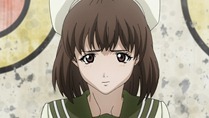
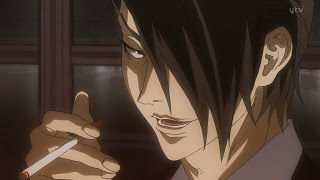
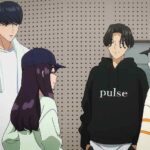

xRichard
April 10, 2012 at 10:35 pmThe anime keeps going good. My only critique is how "average looking" Konoha is in the anime.
Akemi getting shot was one of the most powerful scenes too: http://i.imgur.com/bjzhQ.png
(Not a spoiler).
All my "WHY?".
dv
April 11, 2012 at 3:42 amThought he would have realized by now to protect those around him before anyone else…
SQA
April 11, 2012 at 2:09 amI'd heard some implications to it, but this is pretty much a skilled Japanese mangaka take on a Post-Alan Moore Batman & Superman tale. This could be really good.
I especially liked the moral dilemma with the family. There's no "right" answer here. Jin got lucky but he also knew he increased the risk of all of them dying. Kouga was willing to make the choice to assuredly save the ones that could be without further risking their lives. Both are fully legitimate ways to approach the problem, and if something goes different, Jin's choice puts them all to their death. This is definitely not something you see often in Japanese works but is much more familiar to Western audiences, mostly as it's the essence of much of the Comic universes.
Oh, and I like a main hero that will off the villain that's attempting to kill him. I wish it happened more often.
dv
April 11, 2012 at 3:40 amSo a side character dying once per week… who is next?